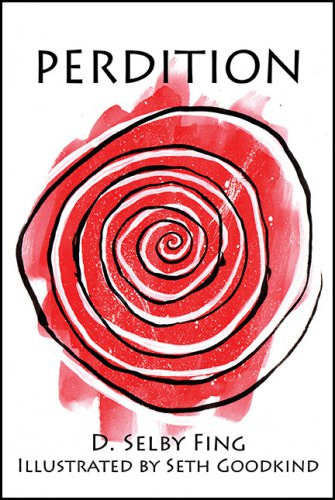
About the Author
ABOUT THE FICTIONAL AUTHOR
D. Selby Fing was a failed priest, poet, father and husband who lived a life of abandonment and sorrow in Philadelphia from 1941-60. Raised by his Catholic grandparents (in circumstances of desperation) to become a priest, Fing had the first of several bouts with mental illness, when he was asked to leave the seminary at age 19. He then became an itinerant English teacher and poet, moving around the USA and finding work in various places, always for a short time, because of his instability. He and his common-law wife, Lilica Del Rio, had two children. They moved back to Philadelphia in the last years of his life, where he experienced his final breakdown after finishing The Profane Comedy. He killed himself on July 4th, 1976.
ABOUT THE ILLUSTRATOR
Seth Goodkind grew up in the scorching heat of southern New Mexico, but escaped to the mossy damp of Seattle, WA where he is a cartoonist, illustrator and tattoo artist. He contributes historical and political comic strips about cults and crime to various underground publications, imbues his skin art with esoteric magick, and watches an inordinate amount of low budget cinema. His artistic influences range from Mesoamerican codices to Hieronymus Bosch and Garbage Pail Kids.
PERDITION: Part One of the Profane Comedy
D. Selby FingScarith, 2020
84 Pages, 30 Illustrations by Seth Goodkind
ISBN 978-1-7348659-4-3 Paperback Color
For BULK ORDERS, order directly from New Academia Publishing.
Queries: orders@newacademia.com
About the Author
ABOUT THE FICTIONAL AUTHOR
D. Selby Fing was a failed priest, poet, father and husband who lived a life of abandonment and sorrow in Philadelphia from 1941-60. Raised by his Catholic grandparents (in circumstances of desperation) to become a priest, Fing had the first of several bouts with mental illness, when he was asked to leave the seminary at age 19. He then became an itinerant English teacher and poet, moving around the USA and finding work in various places, always for a short time, because of his instability. He and his common-law wife, Lilica Del Rio, had two children. They moved back to Philadelphia in the last years of his life, where he experienced his final breakdown after finishing The Profane Comedy. He killed himself on July 4th, 1976.
ABOUT THE ILLUSTRATOR
Seth Goodkind grew up in the scorching heat of southern New Mexico, but escaped to the mossy damp of Seattle, WA where he is a cartoonist, illustrator and tattoo artist. He contributes historical and political comic strips about cults and crime to various underground publications, imbues his skin art with esoteric magick, and watches an inordinate amount of low budget cinema. His artistic influences range from Mesoamerican codices to Hieronymus Bosch and Garbage Pail Kids.
About the book
Perdition is Part One of The Profane Comedy, an epic poem that encompasses all of US history, literature and philosophy. It uses Dante’s epic architecture to show the way to attain enlightenment by following a modern, secular path. Thirty powerful illustrations provide the visual impact.
The poet, with Lincoln as his guide, wanders from scene to scene, first at the gate of hell, with Ronald Reagan, next Herbert Hoover, then Marilyn Monroe, James Dean and Elvis Presley, then a bunch of fetuses, then a hostile audience, and so on, until he comes into Satan’s presence, with Teddy Roosevelt and Nixon nearby. Then he goes through the river of cleansing fire…
In each scene, the featured characters are stand-ins for their time, a microcosmic example of those who (as Dante said of Inferno) had lost the good of their intellect, causing America to lose its creative energy, in recognition of the very destructive energy also unleashed in its imperial expansion. In Perdition they are paying for sins far beyond their own, and the fact that everybody from one period of time has been cast into the pit is yet another irony. By the time Fing finally meets Satan, it’s become clear that the sins have been imperial in nature, a hubristic dominance of the world, and the cold inhumanity of society’s institutions. But Perdition is just the first of three canticles: Limbo, where Fing returns to the mainland of the USA, and Elysium, in which Fing is raised into the heavens.
Praise
“Who would dare to recreate Dante’s journey? Only a writer who will say yes to everything available to him – story, plot, craft, phraseology, cadence, poetry. There are moral signposts here, led by “a teacher;” our speaker’s “Virgil” is Abraham Lincoln. Be aware, however, this is not a book of virtues; it’s a man’s account, viscerally and deeply felt, to the center of consciousness and beyond. Many horrors are conjured, because life is not a pure land. We’re struck with unexpected ironies. and teachings: “You are the equal of everyone you see,” says The Teacher, in this highly-imagined verse drama. Historical characters emerge as hungry ghosts: Herbert Hoover, Ronald Reagan, Theodore Roosevelt – there’s good and evil here, right and wrong, vanity and illumination. Historical parody is mixed with self-examination and personal enlightenment, as this author descends into the hell of truth to emerge into the light of what it truly is to be human. The dramatic tone throughout is assisted by dynamic action/adventure drawings in the tradition of the graphic novel.” —Grace Cavalieri, Maryland Poet Laureate
“This is a very clever, interesting, thoughtful, and original piece of work… The underlying theme that twists Dante’s political passions toward our own world could hardly be more appropriate or more timely, especially right now.” —Ori Soltes, Teaching Professor, Center for Jewish Civilization, Georgetown University





 Coming Soon
Coming Soon Awards
Awards